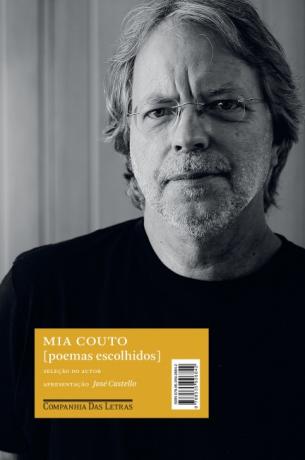Mia Couto (Antonio Emílio Leite Couto) was born on July 5, 1955, in the city of Beira, Mozambique. É biologist, university professor and worked as a journalist when he published his first book of poetry — dew root — in 1983. However, success only came with the publication of the novel sleepwalking land, in 1992.
The author's works, winner of the Camões Award, in 2013, belong to the post-independence period of Mozambique and have features such as magical or fantastic realism, use of neologisms, orality marks and valorization of the cultural memory of its people.
Read too: Conceição Evaristo – author who recovers the ancestry of Brazilian blackness
Biography of Mia Couto
![Mia Couto, in the cover photo of the book Poemas Escolhas, published by Companhia das Letras.[1]](/f/ca53cfbd96c324b4227197fba8d9d359.jpg)
Mia Couto (Antonio Emílio Leite Couto) was born on July 5, 1955, in the city of Beira, Mozambique. Son of Portuguese parents, the author received, in childhood, European and African cultural influences. As a teenager, he wrote his first poems. So he was a poet before he was a novelist.
In 1972, he moved to what is now Maputo, capital of Mozambique, and joined the medical school, which he left two years later to practice as a journalist. Thus, he worked at the Mozambique Information Agency, at the magazine Time and in the newspaper News, until leaving journalism in 1985.
The author, then, he studied biology and later became a university professor. in that area. Thus, in parallel with his career as a writer - which officially began in 1983, with the publication of the book dew root — Mia Couto began to devote herself to research and teaching biology.
With the publication, in 1992, of the romancesleepwalking land, the novelist began to experience success as a writer. For this work, received the National Fiction Award from the Association of Mozambican Writers, in 1995. Today Mia Couto is one of the best known African authors in the world.
In 2013, he received one of the most important literary awards offered to Portuguese-speaking authors, that is, the Camões Award. Years earlier, in 1998, he was the first Mozambican writer to join, as corresponding partner, at the Brazilian Academy of Letters, thus becoming the sixth occupant of chair number 5.
Read too: Pepetela – first Angolan author to win the Camões Award
Characteristics of Mia Couto's work
Mia Couto is an author belonging to Mozambican literature from the post-independence period, started in 1975 and marked by a civil war that lasted 16 years. Because of this, his works have a political character, as they seek to show cultural elements that shape the national identity.
So they undertake a rescue of Mozambican tradition and value their multiculturalism. In addition, the author's texts are characterized by the presence of neologisms, appreciation of colloquial language, in addition to allegories and strong lyricism. They also have traces of the magical realism or fantastic.
Works by Mia Couto
![Cover of the book Terra somnambula, by Mia Couto, published by Companhia das Letras. [2]](/f/abc7fe9e46dd36edb35c7669b042bbbd.jpg)
→ Poetry
dew root (1983)
Dewroot and other poems (1999)
Ages, cities, deities (2007)
rain translator (2011)
→ Tales
night voices (1987)
each man is a race (1990)
blessed stories (1994)
tales of the birth of the earth (1997)
on the side of no road (1999)
The string of beads (2003)
→ Chronicles
chronicling (1991)
the country of the grievance walk (2003)
Thoughts. Opinion texts (2005)
What if Obama were African? and other inter-inventions (2009)
Frequent thinker (2010)
→ Affairs
sleepwalking land (1992)
Frangipani's balcony (1996)
twenty zinc (1999)
sea wants me (2000)
The last flight of the flamingo (2000)
A river called Time, a house called Earth (2002)
the other foot of the mermaid (2006)
God's Poisons, Devil's Medicines (2008)
Jesusalém (2009)
The Lioness's Confession (2012)
Vacancies and fires (2014)
gray women (2015)
the sword and javelin (2016)
the horizon drinker (2017)
→ Children's literature
the cat and the dark (2001)
the rain slamming (2004)
the kiss of the word (2006)
the boy in the shoe (2013)
See too: The best poems by Mia Couto
Phrases by Mia Couto
Below, we are going to read some sentences by Mia Couto, uttered during her participation in the cultural project Fronteiras do Pensamento.
"Childhood has no other nation, one lives there always."
"Forgetting is almost as much a lie as remembering."
“Writing is close to loving, you never have experience in loving.”
"Nobody writes if they're afraid."
"I'm an atheist, but I'm a non-practicing atheist."
"The silence on which we lay the past is a silence that lies."
"Forgetting is a fictional work."
Image credit
[1] Company of Letters (reproduction)
[2] Company of Letters (reproduction)
by Warley Souza
Literature teacher

